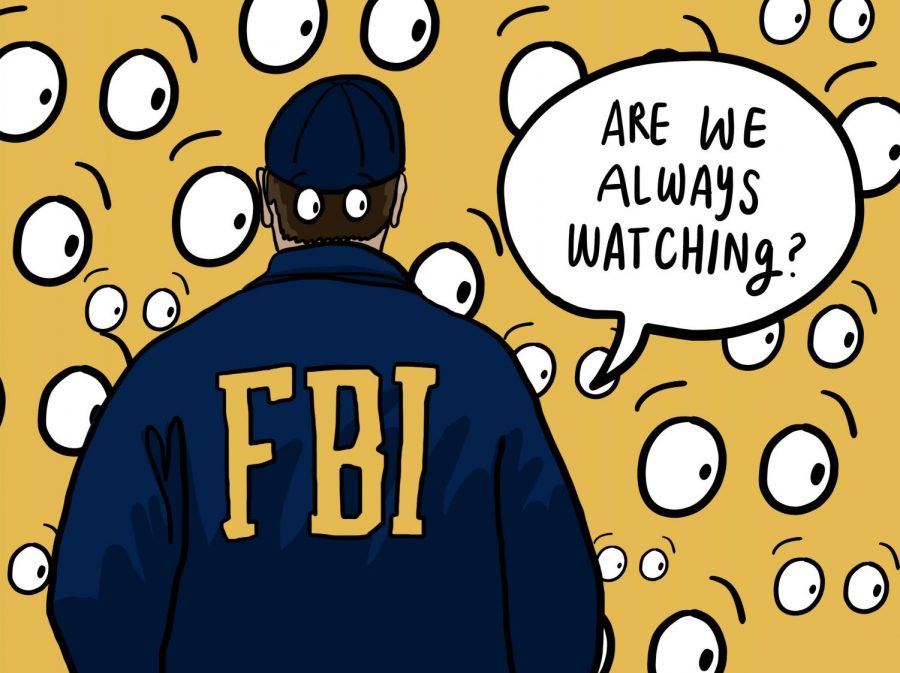Wave to the Camera: The FBI Is Watching
April 2, 2018
If you’re reading this on a phone, laptop or any other electronic device, there is a strong chance your actions online are being monitored right now — but you probably already knew that.
Digital surveillance has long been a point of controversy. Ever since CIA employee-turned whistleblower Edward Snowden leaked critical information from the National Security Agency about the federal government’s extensive surveillance program in 2013, the idea of monitoring and gathering data has seemed to become a fixture in our collective consciousness. From conspiracy theories that people have their own personal FBI agent peeking through their webcam, to concerns that Facebook knows so much about its users — as seen by the recent controversy surrounding Cambridge Analytica — that it can bombard them with advertisements for items they only talked about, many people remain wary of the web.
On one side of the coin, there is concern that surveillance erodes civil liberties, specifically the right to a certain degree of privacy. A survey conducted by the Pew Research Center between late November 2014 and early January 2015 found that 57 percent of Americans find it unacceptable for the government to monitor the communications of U.S. citizens.
Steinhardt junior Dailyn Heredia sides with this majority.
“I’ve been thinking about it [internet surveillance] a lot lately, especially with all the stuff that happened with Facebook,” Heredia said. “Nobody reads terms and conditions, so you don’t really know how much people can know about you.”
On the flip side, there is the argument that surveillance can help detect and prevent threats of criminal activity, such as terrorism. The USA Patriot Act, signed by President George W. Bush in October 2001, shortly after the 9/11 attacks on the World Trade Center and the Pentagon, directly named counter-terrorism efforts its intent behind the heightened surveillance it allowed, as the act’s full title was “Uniting and Strengthening America by Providing Appropriate Tools Required to Intercept and Obstruct Terrorism Act of 2001.”
This case has many people willing to push civil liberties to the back burner. The same Pew Research survey found that 82 percent of Americans believe surveillance of terrorism suspects is acceptable.
Here, Heredia lies in the minority.
One of a number of people who heed former FBI Director James Comey’s advice to cover their webcams, Heredia believes that warranting surveillance for terrorism suspects builds a slippery slope that too often leads to unnecessary surveillance of average citizens.
“You have to think of the people who aren’t doing anything [criminal],” she added. “Anything that is more than what a person wants you to know is an invasion of privacy, regardless of whether you’re trying to do good or not.”
Like Heredia, Tisch junior Bennett Smith thinks many citizens, himself included, don’t think twice about making the trade-off between privacy and safety.
“I think people just don’t really care about privacy,” Smith said. “They prefer security.”
An occasional user of virtual private networks and the anonymity-conscious The Onion Router internet browser, Smith said he nonetheless accepts the current [surveillance] state of affairs.
“I do some stuff [to prevent surveillance], but ultimately, I’m kind of resigned to the fact that all of my data is pretty available to anybody in the government,” he said.
A 2015 study from the American Press Institute found that millennials may not be that fearful of government surveillance after all.
According to the study, approximately 80 percent of millennials worry little or not at all about their personal information being available online.
CAS first-year Tyra Aghimien said she falls into this category.
“I’m usually not doing anything weird in front of my laptop, so if they’re watching, I guess it’s not that weird,” Aghimien said. “I feel like, ‘Can I even do anything about it? Won’t they just find a way to get my information anyway?’”
Smith attributes this nonchalance to the difficulty of finding the impact of surveillance on their lives.
“I think it’s one of those social causes that’s really hard to care about or get involved in because the changes that need to be made are happening on such an extremely secretive level and they don’t impact your day-to-day life,” he said. “Nobody is really suffering the consequences of lack of privacy or government invasion of your security unless you’re a terrorist — right now.”
Read more from Washington Square News’ ‘Conspiracy‘ Feature. Email Sarah Jackson at [email protected].


























































































































































CIA • Apr 4, 2018 at 3:23 pm
This is fake news
CIA • Apr 4, 2018 at 3:15 pm
Not true
FBI • Apr 2, 2018 at 9:50 am
Delete this
moyo wabo • May 13, 2022 at 2:10 pm
why